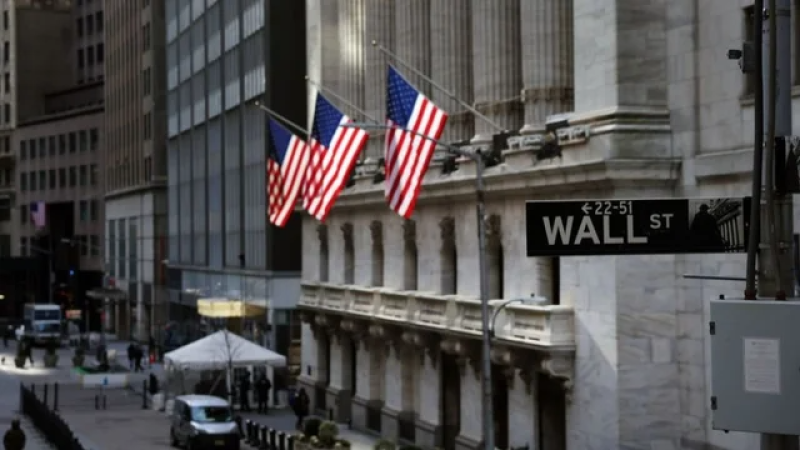Stock Futures Drop After Selloff, Global Stocks Slide - WSJ
Category: News & Politics
Via: vic-eldred • 2 years ago • 2 commentsBy: Joe Wallace and Dave Sebastian (WSJ)



Markets have been looking increasingly shaky recently: Stocks, bonds and crypto have all been falling as investors struggle to manage the large swings roiling financial markets around the globe. WSJ's Caitlin McCabe looks at some of the causes behind the recent market frenzy. Photo: Spencer Platt/Getty Images By Joe Wallace and Dave Sebastian Updated May 19, 2022 8:10 am ET
Stock futures slid, pointing to deeper losses for U.S. markets on growing worries of an economic slowdown.
Futures for the S&P 500 fell 0.8%, suggesting the index will open close to bear market territory—market shorthand for a 20% fall from a recent high. It tumbled 4% Wednesday, its biggest one-day retreat since June 2020. After that drop, the S&P 500 had retreated more than 18% from its January all-time high.
Dow Jones Industrial Average futures fell 0.7% on Thursday, as did contracts for the technology-focused Nasdaq-100 skidded 0.9%.
Kohl’s lost 5.6% in premarket trading after it said sales weakened in April, making the firm the latest retailer to point to inflationary pressures on demand. Walmart and Target this week said higher costs ate into profits in the latest quarter, leading to a selloff of their shares that rippled through the broader market.
Cisco Systems tumbled 11% after the communication-equipment firm missed analyst expectations for its quarterly results. BJ’s Wholesale Club said gasoline sales boosted revenue and profit in its first quarter, sending shares 4.6% higher.
“The critical bit here is how earnings hold up,” said Desmond Lawrence, senior investment strategist at State Street Global Advisors. “We’re in a very uncertain time so we expect more volatility.”
Investors bought government bonds, perceived as a haven asset in times of economic uncertainty. The yield on 10-year Treasury notes edged down to 2.840% from 2.884% Wednesday. The move put yields, which had shot up for much of the year as the Federal Reserve began to raise interest rates, on course to fall for seven in nine trading days. Bond yields and prices move in opposite directions.
Earnings reports from some of America’s biggest retailers in recent days added to concern that the highest rate of inflation in four decades is catching up with U.S. consumers and pitching the economy toward a recession . Investors were already grappling with the end of an era of loose monetary policy that had stoked big gains for stocks and other riskier assets.
The war in Ukraine, meanwhile, is adding to inflationary pressures prompting the Fed to embark on a series of interest-rate rises and to reduce its bondholdings. And Covid-19 shutdowns in China have led to a sharp slowdown in the world’s second-biggest economy.
The combination of factors has fed into steep losses for stocks and some corporate bonds, and many investors expect the volatility to continue. “The price action suggests it’s not over,” said Philip Saunders, a portfolio manager at Ninety One , an asset manager based in the U.K. and South Africa.
The last time the S&P 500 fell into a bear market was during the pandemic panic in March 2020. It was short lived, and the market quickly launched on a two-year rally that peaked on Jan. 3 this year. The Nasdaq Composite entered a bear market in February, dragged down by tech stocks. The Dow Jones Industrial Average, which is more weighted to old-line industrial companies and banking stocks, has performed less badly and is still some ways from bear market territory.
“Throw monetary policy tightening into the mix, we’ve got a recipe for volatility and investor jitteriness,” said Clara Cheong, a global market strategist at J.P. Morgan Asset Management.
Also coming up are data on home sales in the U.S. The figures from the National Association of Realtors are expected to show sales of existing homes fell for a third-straight month in April as rising mortgage rates and climbing prices cooled the housing market.
In energy markets, global oil benchmark Brent crude fell 0.8% to $108.19 a barrel.
International stocks retreated, tracking the U.S. selloff . The Stoxx Europe 600 shed 1.7%, led lower by shares of financial-services and food-and-beverage companies. Hong Kong’s Hang Seng Index tumbled 2.5% as shares of Tencent dropped 6.5% after the videogame giant reported its worst quarterly profit drop since listing in the city.
Among individual European stocks, Credit Suisse Group lost 2.6% after Fitch Ratings downgraded the bank’s credit rating to BBB+. Swiss private bank Julius Baer Gruppe dropped 6.7% after saying its assets under management fell in the first four months of the year.
Elsewhere in Asia, the CSI 300 index of the largest stocks listed in Shanghai and Shenzhen edged up 0.2%. Japan’s Nikkei 225 dropped 1.9% and South Korea’s Kospi Composite declined 1.3%.

Tags
Who is online
88 visitors

"But though we had plenty of money, there was nothing our money could buy, And the Gods of the copybook headings said: "If you don't work you die.""
- Rudyard Kipling
I think progressives view future generations as dependent on government subsidies.